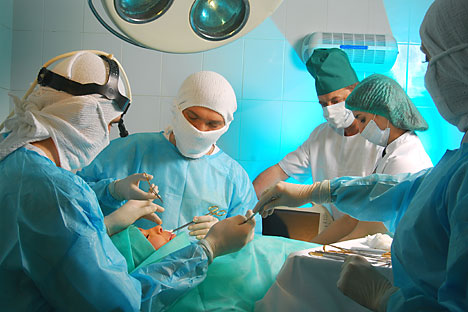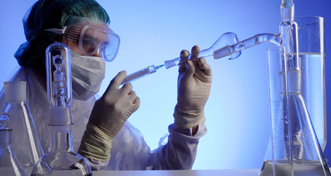Face transplant surgery could become a reality

Approximately 1,500 transplant operations are carried out in Russia annually. Source: Shutterstock / Legion Media
Russian surgeons have stated more than once that they are ready to perform face transplants. In particular, a group of doctors and scientists from St. Petersburg Medical University has been developing a technique for this type of operation on corpses. In 2012 surgeons from the Burn Center of Krasnodar Territory transplanted skin in a single fragment onto a two-year-old child with a complete face burn. Before that, similar operations were carried out only by sewing together separate parts of the face.
Putting the face transplant "on stream," surgeons say, was impossible because of current Russian legislation, such as a bill regulating human organs and tissue transplants that permits only one kind of tissue implantation.
Face transplant surgeries, however, gives the patient a complete new face from the donor, including the nose, tongue and ears. Legally, there has been no way to bypass this juridical case. This is why Russian surgeons have been practicing on silicon models with exact copies of muscles, nerves and facial surfaces.
Surgeons need new laws
Having raised the issue of changing the legislation, surgeons say that the process of collecting facial tissues from the donor and its transplant is in itself a complicated process. The imperfection of the legislation and the Russian mindset only makes matters more complex.
According to doctors the challenge of creating a donor service is immense as few Russian citizens are willing to "give" their face to another person. A Levada Center survey shows that about 50 percent of Russians are against donating their organs for transplant surgery.
Approximately 1,500 transplant operations are carried out in Russia annually. By comparison in the U.S. there are roughly 20,000 such surgeries every year with 15 to 20 donors for every one million people in Europe and the U.S. Spain has the highest percentage with 28 to 35 donors for every million people, whereas in Russia that figure is only 2.9 for every million people.
"Currently, doctors can transplant organs if there is no official refusal from the relatives of the potential face donor or from the donor himself," says plastic surgeon Georgy Abovyan. "This is the last loophole in the legislation."
Dmitri Davydov, a professor, surgeon and the author of several methods of maxillofacial surgery, believes that the Russian health system is still not ready to put face transplants "on stream."
"The problem is much more serious," Davydov remarks. "There are several parts to it, including the juridical aspect, the agreement period, the rehabilitation.” He also said that the operation itself depends greatly on the surgeon and their team.
“Every specialist wants to demonstrate his professionalism and transplant a face,” he says. “In this sense I understand my colleagues. But there is also a period of acclimatization, because the donor's skin has a different genetic code."
In Davydov's words, after an operation it is important to suppress the patient's immune system. This involves daily medical treatment, which can cost between 400,000 and 500,000 rubles a month ($10,000-13,000). Davydov thinks that Russia's healthcare system is currently unable to absorb such costs, since drugs, patient care and rehabilitation are very expensive.
A constitution for transplant surgery
For some time Deputy Prime Minister Olga Golodets has focused her attention on the complex issue of organ transplants. She saw that cancer patients were obliged to travel abroad for bone marrow transplants because Russia simply does not have enough donors.
The Health Ministry has already prepared an aptly named document that has been referred to as the Transplant Constitution, which seeks to regulate the process of donating human organs for transplant surgery.
This document should be approved by the end of 2014 and will likely come into effect on January 1, 2016. The amendments to the law included in the Constitution will make it easier for Russians to donate their body parts for transplant surgery.
After the law comes into effect Russia will have a single database for all types of transplants. This database will store Russian citizens’ declarations of intentions, a list of living and deceased donors, the names of recipients and the index of organs. Children who are at least a year old will be able to become donors, although this would happen posthumously and only with the consent of their parents.
"The Duma is already considering a law from the government regulating transplant surgeries involving donors' organs and tissues," says Sergei Kalashnikov, the President of the Duma Health Committee. "The numerous problems facing the country will be solved in the immediate years after the law takes effect."
The Russian Health Ministry is also working to make face transplants legal and has issued a decree that will regulate human tissue and make it easier to transplant a face with vessels from a deceased person onto a living patient. This will open new opportunities for face transplant surgery in Russia.
All rights reserved by Rossiyskaya Gazeta.
Subscribe
to our newsletter!
Get the week's best stories straight to your inbox

